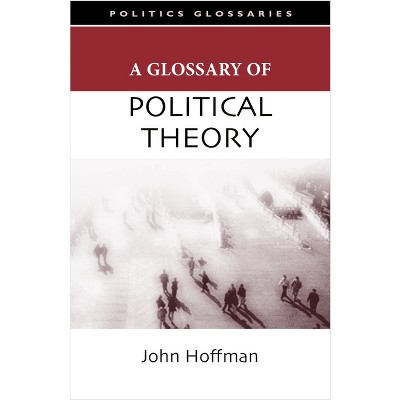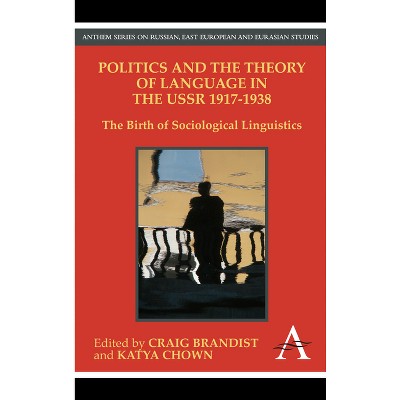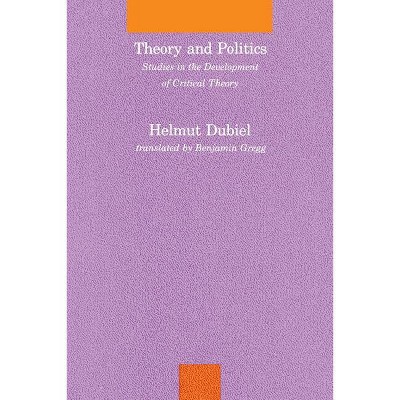EU Energy Geopolitics - (Environmental Politics and Theory) by Filippos Proedrou (Hardcover)

About this item
Highlights
- The global energy transition will be a game-changer for global politics.
- About the Author: Filippos Proedrou is Associate Professor of Global Political Economy in the University of South Wales.
- 139 Pages
- Political Science, Public Policy
- Series Name: Environmental Politics and Theory
Description
Book Synopsis
The global energy transition will be a game-changer for global politics. The field of energy geopolitics hence is changing fast, providing challenges, opportunities and variable outcomes for states across the world. The academic scholarship on the geopolitics of renewables has expanded exponentially over the last decade focusing on winners vs losers, conflict vs cooperation and establishing initial expectations and general propositions regarding the outcomes of the global energy transition. Cases studies, however, have been far and few, and appear in book chapters or, more rarely, journal articles. Overall, there is a dearth of academic monographs examining in depth how specific actors in the global system approach new energy geopolitics, how they are impacted by the global energy transition, and how this links with their grand strategy. This short monograph aims to fill this gap by offering an up-to-date case study of EU energy geopolitics. Grounded upon the sub-field of energy geopolitics, it produces a conceptual framework linking the global energy transition with EU grand strategy to assess how it impacts EU's position in the global system, as well as the strategic gains, trade-offs and risks implicated. The book takes as its starting point and reviews systematically the main assumptions of the geopolitics of the global energy transition literature and the EU energy and climate policy that drives and shapes the EU energy transition. It subsequently focuses its attention on the impact of the EU energy transition on EU energy security, economic competitiveness and foreign policy/ power position and the potential it generates for more conflict or cooperation. The discussion is anchored in the different forms of power the EU operationalizes and showcases the strengths, limits and antinomies of the EU power toolbox in EU energy geopolitics. The originality, significance and contribution of this monograph lies in the cross-fertilization of fossil divestment and clean energy geopolitics, energy and climate policy, energy transition and EU as a power scholarship, with an eye to provide a comprehensive, up-to-date account of new EU energy geopolitics. In all, this monograph dissects the prospects and geopolitical implications of the new energy geopolitics, and the foreign policy ramifications engendered by the global energy transition. This book is aimed at academics and students in the areas of International Relations, International Political Economy, European Studies, Geopolitics, and Energy Politics. It aspires, moreover, to become a reference point for the scholarship in the field of energy (geo)politics. Moreover, it will be of value to think-tanks and policy-makers working in the fields of foreign, energy and climate policy.
From the Back Cover
EU Energy Geopolitics presents an easy-to-follow, in-depth look at how the European Union shapes and is shaped by the geopolitics of the energy transition. It provides a much-needed case-study that highlights the complex interactions in energy security, market dominance, and political power.
-Daniel Scholten, University of Minnesota
This eloquent monograph analyzes in what ways, to what extent and under what premises the EU emerges as a global energy transition winner and what that transition means for EU foreign policy. It unpacks the main pillars of the new energy geopolitics, zooms in on the central questions in the global energy transition literature, and provides well-substantiated answers from the EU perspective.
- Indra Øverland, Norwegian Institute of International Affairs
This short monograph examines in depth how the European Union is approaching new energy geopolitics, how it is impacted by the global energy transition, and how this links with its grand strategy. The book takes as its starting point the EU energy and climate policy that drives and shapes EU energy transition. It subsequently focuses its attention on the impact of the EU energy transition on EU energy security, economic competitiveness and power position, and the potential of the global energy transition for a more peaceful world. The discussion is grounded on the geopolitics of the global energy transition literature and anchored in the different forms of power the EU operationalizes, and showcases the strengths, limits, and antinomies of the EU power toolbox in EU energy geopolitics. This book dissects the prospects and geopolitical implications of the new energy geopolitics and the foreign policy ramifications engendered by the global energy transition.
Filippos Proedrou is Associate Professor of Global Political Economy in the University of South Wales. He is the author of Energy Policy and Security under Climate Change (Palgrave 2018) and EU Energy Security in the Gas Sector: Evolving Dynamics, Policy Dilemmas and Prospects (Ashgate 2012).
About the Author
Filippos Proedrou is Associate Professor of Global Political Economy in the University of South Wales. He is the author of Energy Policy and Security under Climate Change (Palgrave 2018) and EU Energy Security in the Gas Sector: Evolving Dynamics, Policy Dilemmas and Prospects (Ashgate 2012).











